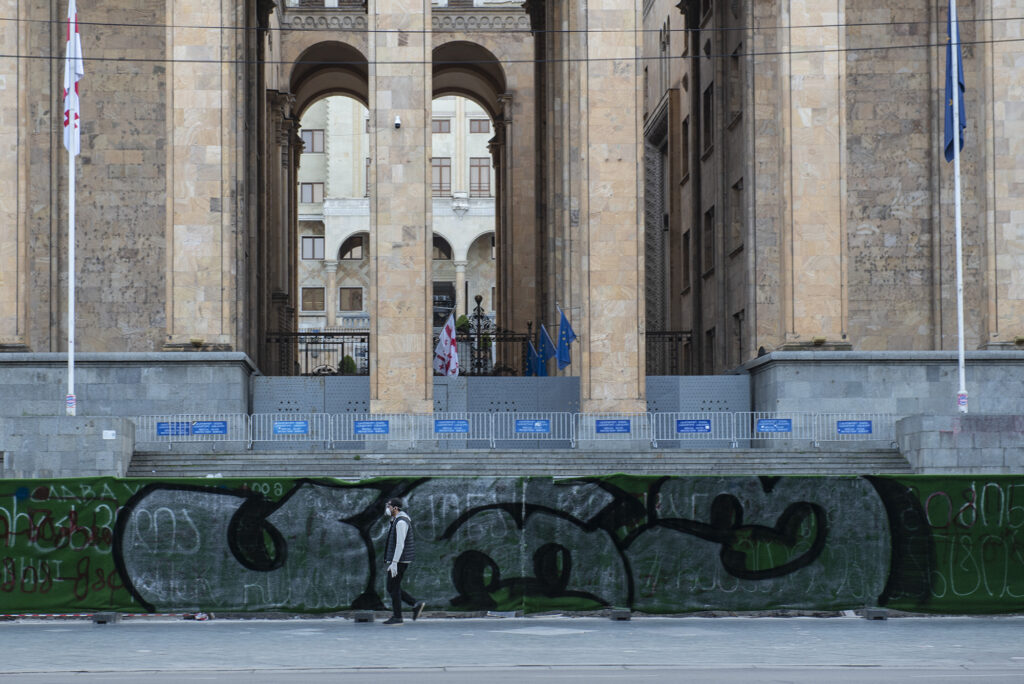Amnesty International has criticised governments across the Caucasus for the impact on human rights of their responses to the COVID-19 pandemic.
The international human rights group published a report on Wednesday assessing the impact of measures taken in eastern Europe and central Asia.
They criticised increased digital surveillance in Armenia, alleged discriminatory appliance of restrictive measures to different religious groups in Georgia, and beatings in Chechnya
In Azerbaijan, the group accused the authorities of using the pandemic as cover to step up their crackdown on dissent.
The report said that President Ilham Aliyev’s announcement of ‘new rules’ on 19 March was followed by high profile arrests of political and civil rights activists on spurious charges, including the arrest of opposition activist Tofig Yagublu on charges of hooliganism and human rights defender Elchin Mammad on charges of theft.

‘The authorities have mounted a wave of harassment against activists who criticised the government’s handling of the pandemic. Azerbaijani human rights activist and former prisoner of conscience Ilkin Rustamzade and his family have been facing threats and harassment since Ilkin Rustamzade launched a petition asking the government to provide financial aid to persons affected by COVID-19.’
[Read more: Azerbaijani pro-democracy campaigners ‘fear they are being set up’]
The organisation said that several other activists and journalists who have criticised the government’s response to the pandemic have been arrested and remanded in detention for between 10 and 30 days on bogus charges including disobeying police orders or breaking the rules of quarantine.
[Read more: Azerbaijan opposition party claims nearly a dozen members arrested in last two weeks]
The organisation also criticised the misuse of an application introduced to control people’s movement through electronic permits.
‘This requirement has already been misused by the police to charge activists for breaking lockdown/quarantine rules and to issue administrative arrests’, they wrote.
Chechnya assaulting citizens for violating rules
The organisation said that while the Russian authorities had taken a heavy-handed approach to enforce measures to address COVID-19 in general, policies in Chechnya went beyond this.
They noted Head of Chechnya Ramzan Kadyrov’s comments on 24 March that those who violate the self-isolation regime ‘must be killed’.

‘Videos purportedly made in Chechnya showed police wielding plastic pipes to allegedly punish those who do not wear face masks. On 4 April, a video was published in which members of the police and other Chechen security forces were kicking and assaulting a man for not wearing a face mask’, the group wrote.
They also recalled a video published by Chechen State TV on Instagram in which Kadyrov approves of the police officers’ actions saying that ‘it’s better to beat one than bury a hundred’.
Armenia allowed broad powers of surveillance
The report said that amendments passed by the Armenian parliament on 31 March gave the government broad powers of surveillance.
The law obliges telecom companies to give the authorities access to all their phone records, including private communications and the locations of their customers, to identify and monitor anyone infected with COVID-19.

‘We call on all governments not to respond to the COVID-19 pandemic with increased digital surveillance unless, in exceptional circumstances, the measures they introduce are demonstrably legitimate, necessary and proportionate, and non-discriminatory.’
‘The COVID-19 pandemic cannot serve as an excuse for indiscriminate mass surveillance of any kind. Any surveillance measures brought in must be time-bound, and only continue for as long as necessary to address the current pandemic’, the report said.
The organisation elaborated that people subject to such measures must be informed and that judicial bodies must be granted extensive investigative powers to ensure that individuals who have been subjected to surveillance have access to effective remedies.
Orthodox Church privileged in Georgia
Amnesty International praised the Georgian government response describing the emergency measures enacted as ‘necessary, proportionate, and motivated by legitimate public health objectives’.
However, the group noted that ‘concerns were raised that certain anti-COVID-19 measures were applied in a discriminatory fashion’.

They noted that contrary to medical advice, religious gatherings had not been restricted by law largely to ensure that the Georgian Orthodox Church could conduct liturgies for Orthodox Easter.
‘On 15 April, the head of the Muslim community of Georgia, Mirtaghi Asadov, declared that when Ramadan begins, they will also open mosques and expect that the government will treat them with the same understanding as they have shown to the Orthodox Church’, the organisation wrote.
They noted that two days after this statement, Asadov was summoned for questioning to the State Security Service in connection with an attempt to ‘sabotage’ the state.




 30 April 2020
30 April 2020



